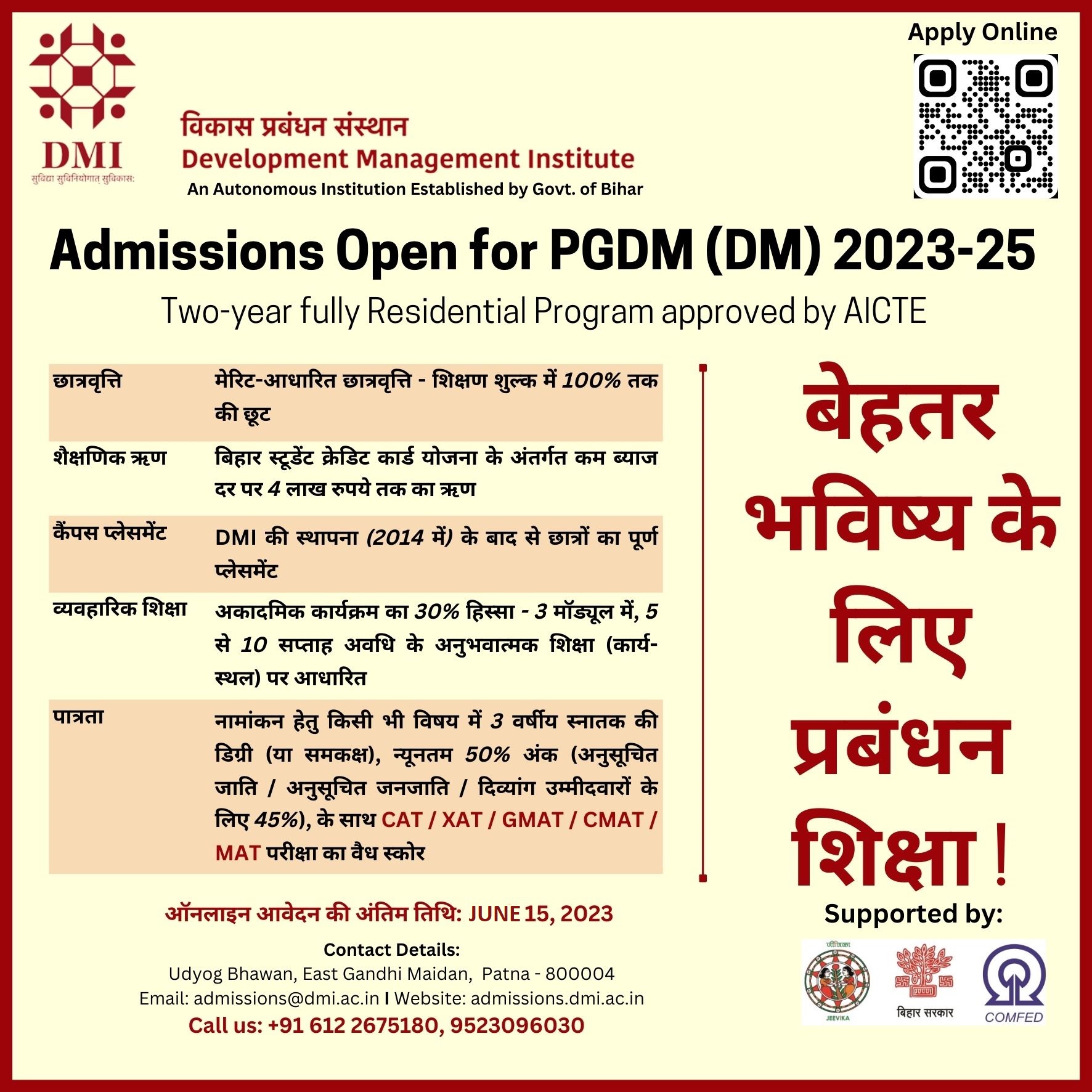
Warm Greetings from Development Management Institute (DMI), Patna!
We are excited to share with you information about the one-day knowledge sharing initiative organized at DMI on Evaluation Communication and Use on June 3, 2019 at DMI Patna as part of gLOCAL Evaluation Week. This event has been convened by DMI to support the CLEAR Initiative together with local and global partners.
The day long activity has experienced enthusiastic deliberations on Communication of Evaluation Results derived from wide ranging interventions - from Transgender to MNREGA to JEEViKa and many more. The participants comprised frontline to mid-level managers of M&E, and have come from varied organizations.
In the morning, Dr. Nishant Chadha and Ms. Soma Wadhwa of IDF research (www.idfresearch.org) have set the context on the Need for the Evaluation Output. The session highlighted that evaluation is all about learning about the intervention and evaluation communication is necessary as there are no direct feedback mechanisms that would be available for any kind of development interventions. The complexity of the design to ensure that the attribution to the intervention as per the theory of change is vital for advocacy and dissemination of the findings. The various types of evaluations, project evaluation, organizational evaluation and network evaluation are important for various stakeholders. A few of the uses of evaluation communication are feedbacks to correct the course of the project, renewal or strategic or withdrawal or closure of the project/program, buy-in by various stakeholders based on the effectiveness of the intervention etc.
This was followed by a discussion on strategy for designing communications mix for evaluation communication. Dr. Sridhar highlighted the strategy influencers given the types of stakeholders, the expected outcomes from the intervention, and the benefits of communicating the evaluation results. The strategy influencers before choosing a particular set of communication strategy are
A. Complex nature (multiplicity of outputs and outcomes etc. Conflicting outcomes, Temporal reversals of findings) of the results to be communicated,
B. Preferences over Results for Communication (Ethical Dimension),
C. Stakeholders needs depending on the type,
D. Dependency on custom and historical circumstances, and
E. Asymmetries in Communication (Positive Results may require more effort compared to negative results)
The post lunch sessions focused on providing case examples from practitioners and academicians on how results from evaluation communication are disseminated using various mediums to achieve their desired end for the communication dissemination.
Prof. Niraj's twin objectives of creating a policy document for transgenders for the state of Odisha and empowering the transgenders in their everyday life necessitated not only a robust design of research methodology but also identifying the various stakeholders, the number of transgender people and their geographical distribution, and effective communication channels to disseminate the results of the research to sensitize the stakeholders and the common people about transgender. The intra-institutional communication within police departments across the state, media interviews, news paper articles and academic papers in journal articles and formal and informal communication channels to communicate with transgenders have all been used to sensitize the stakeholders and to achieve the twin objectives.
Prof. Surya Bhushan shared his findings of research done by him along with a few other faculty members of DMI on the reasons behind low uptake of the Government Scheme MGNREGA in Bihar. The program has been designed for the poor and yet, the poorest of the poor are not part of the MGNREGA and so the Government of Bihar wanted to understand the reasons behind the poor outcomes from such a vital intervention in the history of India. A few of the evaluation findings for the low uptake are
a. Low level of MGNREGA awareness, including processes. Lack of decentralization of information
b. Weak Gram Sabha suggests Mukhiyas possessing large social and financial capital are able to generate more person days than otherwise.
c. Low and delayed wage payments also another factor
d. The project functionaries suffers from twin problem of low level of compensation and ultra vires responsibilities.
These findings are being disseminated by the team in the form of reports, conducting workshops across the state for government officials and thereby influencing the government to address these issues.
The third case example, on Tata Steel Rural Development Society(TSRDS) focused the impact of their interventions on sustainable development in the local areas where the TSRDS was actively involved in enhancing their welfare. Prof. Anirudh Prasad was given the task of conducting the evaluation research by TSRDS. He gave a detailed account of what is evaluation, types of evaluation, characteristics of evaluation studies and how these basics of evaluation have helped in designing a robust research methodology to study the impact of TSRDS on sustainable development over a period of three long years. The findings were mixed in nature as both positive and negative were observed and communicating the same to the key stake holder of TSRDS.
Finally the day ended with Mr. Pankaj of JEEViKA sharing knowledge on how JEEViKA sets the expected outcomes, indicators for measurement and then how the project is evaluated internally and by external agencies. Emphasis was on how internal stake holders of JEEViKA use the information from MIS and grassroots to monitor and evaluate the achievements of the project in a timely manner and dissemination of the same in the form of reports, achievements made in the process and providing a proper feedback to the grassroot cadres on building robust community based organizations with improved incomes, credit uptake etc.
We sincerely thank all our participants for supporting us in our endeavor of spreading the importance of evidence based decision making as part of the CLEAR initiative. While the oral feedback for the event is that it is well organized, the topics were comprehensive and highly relevant, the speakers are very knowledgeable and that the sessions were engaging.
The organizing team comprises Prof. Niraj Kumar, Senior Professor and Dean, Dr. Surya Bhushan, Associate Professor and Dr. Sridhar Telidevara, Associate Professor.
We express our sincere thanks to Prof. Hemanth Rao Hanumankar, Senior Professor and Director, DMI and the faculty and staff at DMI who have shared their enthusiasm and energy in organizing this event. A special thanks goes to Mr. Manoshankar for his sincere efforts in communicating with various organizations to generate the awareness about the event and for all the necessary arrangements.
Download presentations







